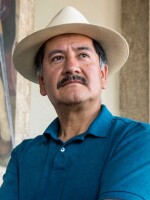MICHEL MARTIN, HOST:
Los Angeles County is home to the second-largest population of Native Americans in the U.S., but many of them feel lost in a place that once belonged to them. In 1961, Kent Mackenzie's groundbreaking film "The Exiles" told the story. Now 55 years later, that story is being told again by the LA-based Cornerstone Theater. It's a play called "Urban Rez." And, as Betto Arcos reports, it's a collaboration between the theater company, the playwright and the community.
BETTO ARCOS, BYLINE: "Urban Rez" is set at a town fair organized by a local drive.
(SOUNDBITE OF PLAY, "URBAN REZ")
UNIDENTIFIED MAN: (As government representative) If you are able to prove who all these tribal members are...
ARCOS: The representative from the Bureau of Indian Affairs is asking an artist to make sure all the tribal members have ID.
(SOUNDBITE OF PLAY, "URBAN REZ")
KENNETH RAMOS: (As Max) Oh, well, not all of them have proof but most of them are here. You can interview them directly.
ARCOS: One of the central narratives of "Urban Rez," says playwright Larissa FastHorse, is the application process to get federal recognition a tribe, the Nicolenos.
LARISSA FASTHORSE: They were originally from San Nicolas Island, and they have all disappeared from our planet. And so we are using them as our tribe in this story to explore identity politics and the way that the government has forced impossible situations onto the indigenous people of this country who are trying to get re-recognized.
ARCOS: FastHorse says there are no federally recognized tribes in all of Los Angeles and Orange Counties.
FASTHORSE: Not one. There is no Indian land in either of those counties. And it's been an endless battle to try to get that recognition and try to get Indian land.
ARCOS: To flesh out that story, Cornerstone Theater went to the community, says the company's artistic director, Michael John Garces, who's also directing the play.
MICHAEL JOHN GARCES: When we start asking people in the community to participate in telling a story so we can make a play, we have no idea what that play's going to be about or what the structure is going to look like. And a lot of what we find out along the way is, informationally from people, is not only what the stories are but really what form it should take in the context of that community.
ARCOS: Cornerstone Theater doesn't present plays in a theater but in locations that reflect the stories. "Urban Rez" is staged at the Los Angeles State Historic Park.
(SOUNDBITE OF PLAY, "URBAN REZ")
JENNY MARLOWE: (As Robbie) You came to me today and said that I'd be the last my line, that if I had kids with a nontribal guy they wouldn't have enough native blood to be members.
ARCOS: Jenny Marlowe, from Cape Cod, Mass., is of Algonquin descent. She plays Robbie, a Nicoleno Indian. Marlowe says the common thread running through the "Urban Rez" stories is the search for a balance between personal identity and cultural background.
MARLOWE: Each of the characters, in some way, is wrestling with some version of that question - who am I as myself, what does it mean to be a part of a tribe and how do I reconcile the two?
FASTHORSE: You know, we have a huge multibillion-dollar industry of people searching for their DNA and having it mapped and finding out where they come from. But then what do you do what that information? Like, what does that mean?
ARCOS: Playwright Larissa FastHorse.
FASTHORSE: There was a woman the other day that came to me afterwards and just broke down crying 'cause she said, I don't know - I know what I say my ethnic makeup is. I know what I say my geographic history is, but I don't know what that means and I don't know what that means for my children. And this play really changed my life and my thinking.
ARCOS: FastHorse says identity is about who you are and what you pass on, what your ancestors mean and how you honor them. And then, says FastHorse, look at the person next to you and have empathy for them, where they come from and where they're going. For NPR News, I'm Betto Arcos. Transcript provided by NPR, Copyright NPR.

